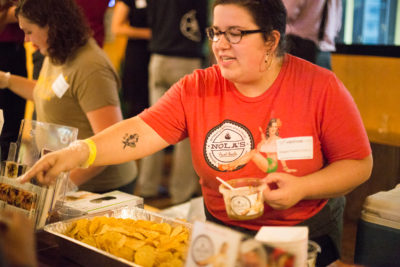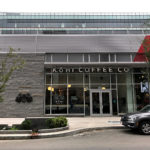
On Thursday, entrepreneurs, students and curious people alike gathered at the Cambridge Innovation Center to discuss the intersection of food and technology.
“FoodBev Connect: Boston’s Recipe for Food Innovation” featured dozens of speakers, all of whom are notable members of the food technology industry. The schedule of roundtables and panels covered a variety of topics that ranged from “Food Product Innovation” to “Launching a Food Startup.”
The conference was hosted by Venture Café, a nonprofit located in the Cambridge Innovation Center, which focuses on providing networking opportunities for “entrepreneurs, investors and innovators.”
“Venture Cafe was founded on the idea that entrepreneurs need a space and opportunity to make the right relationships in order to be successful,” said Chandra Briggman, director of Venture Café Kendall.
Networking is at the core of everything at Venture Café. Before the speakers began at the FoodBev conference, special food and beverage office hours were available to book by attendees. These office hours were led by two leaders in the food innovation business, Le Zhang, restaurant and retail operations platform Squadle, and Jose Barriga of the Cambridge Food Lab.
“We are the only place in Boston that provides open office hours where entrepreneurs can book to consult with an expert,” Briggman said.
After the networking opportunities, Doug Rauch, CEO of Daily Table and former president of Trader Joe’s, led a Fireside Chat. In a discussion moderated by Scott Kirsner of The Boston Globe, Rauch discussed the success story of Trader Joe’s and the future of the grocery business.
“How many of you cook, every day, from something that you’ve purchased in-person from a grocery store?” Rauch asked to begin the conversation. Many audience members raised their hand.
“That’s because most of you are over 30,” Rauch joked, cueing laughter from the audience.
He continued to talk about the modernization of the grocery business, specifically as e-commerce titan Amazon continues to push its own grocery program, AmazonFresh.
“If you’re a retailer and you’re not offering something that’s not on the internet, then you’re in trouble,” Rauch said to the audience.
When The Daily Free Press asked Rauch about the future of the food business advertising for college demographics in light of the growth of college influencers who advertise various products on their social media platforms, Rauch was wary about a potential lack of genuity.
“The world has become so transparent nowadays that [the ads] will come back to bite them,” Rauch said, noting that if people really love food for what it is, it’ll sell itself.
Kirsner directed the talk toward Rauch’s newest venture, Daily Table, which works to limit food waste and bring affordable nutrition to those who face food insecurity.
Ashley Lopes, a graduate student in Boston University’s Metropolitan College studying gastronomy, said she attended Rauch’s talk because of her passion for eliminating food waste.
“One of the biggest problems is ‘ugly produce,’ or produce that is deemed unsellable because of its cosmetic blemishes,” Lopes said. “People like Rauch are working to make sure that it gets from farm to table, and not straight to the landfill.”
There were several discussions that followed Rauch’s Fireside Chat, such as the Agtech Roundtable, “Drones and Coffee Farming.”
The discussion included speakers Erik Modahl, founder of beantrust, a customized coffee program, and Nikhil Vadhavkar, CEO of Raptor Maps, a company that specializes in “data processing and machine learning,” among others. Participants in the roundtable discussed the future of coffee farming and the inclusion of drone software in the process.
Other panels included the “Financing Food Ventures and Food Tech” roundtable, where four investors provided insight on how to fund food tech startup.
Following discussion was the Food and Tech Panel, where a moderator and four panelists discussed the future of food technology and what it might look like fifty years from now.
Among the panelists was John Pepper, co-founder of the Boston-based fast-casual chain Boloco.
The conference shed light on the enormous food technology industry. The industry is changing, fast, and if FoodBev Connect was any indication, the growth and change of the food industry won’t be stopping any time soon.














